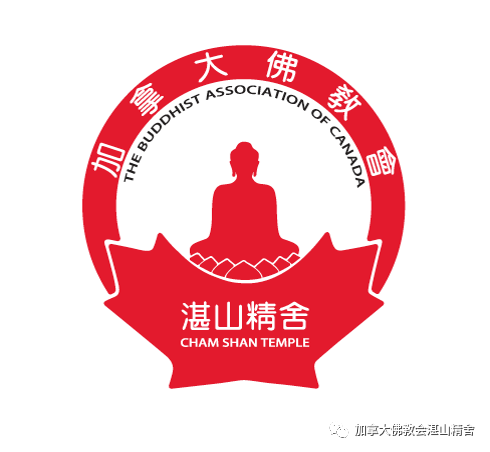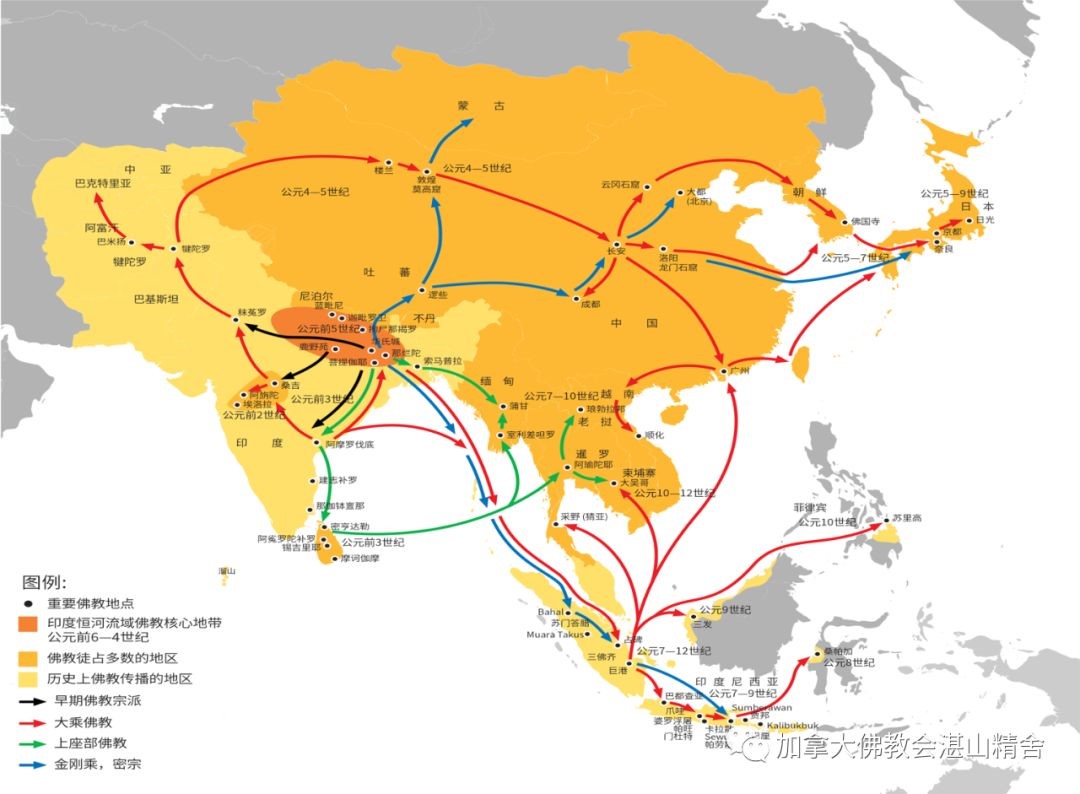未来就在当下
—达义大和尚在世界佛教徒联谊会精彩演讲
发布: 2019-11-24 22:53:19 作者: 本网讯 来源: 本网讯
加国佛教会湛山精舍The Buddhist Association of Canada Cham Shan Temple
智慧人生——中国传统文化北美绽放50载

Living with Wisdom——Chinese traditional culture blooms in North America for 50 years
达义大和尚认为佛教的因果关系就是对未来即在当下的最好诠释
2019年11月16日,加拿大佛教会会长达义大和尚一行应世界佛教徒联谊大会的邀请,在泰国进行精彩演讲《未来就是当下》。
达义大和尚是国际弘法组主席,今次在泰国的会议是世界佛教徒联谊会弘法组会议。
会议将在2019年11月15-17日,由各国大德高僧从不同角度分析和讲述禅的境界。
会议地点是在泰国有300多年历史的Wat Maheyong(红玛寺)举办。
未来就在当下
The Future is at the Present
加拿大佛教会 释达义
Ven.Dayi Shi
The Buddhist Association of Canada
佛教的因果关系就是对未来即在当下的最好诠释
Buddhism’s perspective on “Cause and Effect” is the best explanation for the idealism that “the Future is at the Present”.
由此可见:
当下的因决定未来的果;
未来的果就是当下的因。
Present decisions determine the future. Therefore, the future effect is caused by the present.
第一部分:如是因如是果
Part 1:Such as it is the Cause, it is the Effect
1.佛教的因果论
1.Buddhism’s Law of Causation
佛教经常提出:过去、现在、未来都是一体,提倡不管修学什么法门,修持方法或有不同,因为八万四千法门殊途同归,目的都是一个。这也正是我们常常所说的,如是因如是果。
Buddhism constantly refers to the unity of the past, the present and the future. It advocates that whatever method or school of practising Buddhism, they all have one common denominator – which is the concept that “such as it is the Cause, it is the Effect”.
有因就会有一个果,种善因就有善果 ,种恶因就有恶报,种富贵的因就有一个富贵的果,种长寿的因,就有一个长寿的果,总之,种什么因就有什么果。
Where there is a Cause, there is an Effect. You reap what you sow.
种瓜得瓜,种豆得豆,一切都是人的心念在作怪。行动是证明你心里所想的东西,所以一切唯心造 。在现实生活中,就像我们在天空看到的是一朵云,你把它想成莲花就是莲花,想成动物就是动物。有什么意念就会有什么举动,就会有什么变化。
You reap what you sow – it all stems from your mind. Actions reflect your mind’s thoughts; hence all phenomena are manifestation of the mind. For example, if we look up at a cloud in the sky and imagine it to be a lotus, it will become a lotus. You imagine it to be an animal, it will become an animal. Your thoughts become your action which becomes the change in perception.
据《俱舍论》(卷六):
“于诸果中、应说何果,何因所得。
颂曰:后因果异熟,前因增上果。”
As stated in the Abhidharmakosakarika (Chapter 6):
“Of all the causations, which cause is the preceding origin for which effect?
Verses proclaimed: “What follows the ripening karmic effect, is the preceding dominating cause”.
根据佛教因果论,人们的业是其幸福和痛苦的根本原因。佛教认为,积极的行为能产生更大的幸福,而负面的行为则会导致更大的痛苦。
According to Buddhism’s Law of Causation, karma is the root cause of all positive and negative things that happen to mankind. Positive action will create more joy whereas negative action will create more suffering.
2、因果之间的关系
2. Causality/Causation
因果关系(英语:Causality 或 Causation)是一个事件(即“因”)和第二个事件(即“果”)之间的作用关系,其中后
一事件被认为是前一事件的结果。
Causality, or Causation, is the interplay between one event (the Cause) and another event (the Effect), with the latter event being deemed as the result of the former event.
通常一个事件是很多原因综合产生的结果,而且原因都发生在较早时间点,而该事件又可以成为其他事件的原因。
Usually, a particular event is the end result of the interplay between many causative factors, which usually occurs before the event. The event itself can also be the causative factor for future events.
一般来说,因果还可以指一系列因素(因)和一个现象(果)之间的关系。对某个结果产生影响的任何事件都是该结果的一个因素。直接因素是直接影响结果的因素,也即无需任何介入因素。从这个角度来讲,因果之间的关系也可以称为因果关联(Causal Nexus)。
In general, Causation can also refer to the relationship between a series of Causes and one phenomenon (Effect). Anything that influences the end result is a Cause of that result.
原因和结果通常和变化或事件有关,还包括客体、过程、性质、变量、事实、状况;概括因果关系争议很多。对因果关系的哲学研究历史悠久,佛教和西方哲学家如亚里士多德在2000多年前就已经提出了因果,该问题仍是现代哲学的重要课题。
Cause and Effect is usually related to change or occurrence of an event. This includes changes to the object, the process, the quality, the quantity and the condition. Buddhism and western philosophers such as Aristotle had been examining the concept of Causation for almost 2,000 years. Today, it is still an important topic in the area of philosophy.
第二部分:因果关系在生活中无处不在
Part 2:Causation is Ubiquitous
因果关系就在我们的生活中。经济、法律、医学、物理、统计、哲学、宗教等众多学科,都与因果的分析密不可分。
Causation is ubiquitous in our every day lives. Causation is an inalienable concept in the field of finances, laws, medicine, physics, statistics, philosophy, religion, and many other areas of studies.
例一:佛教历史的因果关系
Example 1: Causation in Buddhist History
佛教由古印度的释迦牟尼在公元前6世纪以前创建,与基督教和伊斯兰教
并列为世界三大宗教。
The religion of Buddhism was founded in the 6th century B.C. by Siddhārtha Gautama. It is one of the 3 most common religions in the world, along with Christianity and Islam.
“佛”是佛陀的简称,其意思是觉悟者;而“教”可以理解为宗教或教育,
意为佛陀对大众的一种普遍而传承的教育。佛教一般注重人心灵的清净和
觉悟,佛教认为世界是遵循因果循环,只有达到觉悟,才能超越生死轮回。
释迦牟尼佛涅槃后,佛教慢慢衍生了不同的派别,才有了后期的发展。
In Chinese, the word for “Buddhism” is comprised of the character “佛”and “教”. “佛” refers to Buddha, or the “enlightened one”. “教” means religion, or teaching. Together, it denotes the Buddha’s wish to teach mankind. Buddhism generally focuses on the clarity and awakening of the mind, and it believes that the world is a cycle of cause and effect. Only through the awakening of our true nature can one transcend Samsara (i.e. cycle of life, death and reincarnation). Buddhism develops into various schools of teachings only after the Nirvana of Sakyamuni Buddha.
由此可见:
佛教的起因是佛的诞生,果是佛涅盘后佛教的传播。
As such, the Cause of Buddhism is the birth of Buddha, and the Effect is the propagation of the Buddhist religion after the transcendence of Buddha.
例二:佛教三大语系的因果关系
Example 2: Causation in the Three Main Schools of Buddhism
自从阿育王时期,佛教不断向外传播,主要分为北传佛教和南传佛教。北传佛教,以大乘佛教为主,经过印度北部,新疆传入中国腹地,再流传到中国东北,再传播到韩国、日本及越南;唐朝时期传入西藏,于是北传佛教被后人分称汉传佛教和藏传佛教。南传佛教则以上座部佛教为主,则通过斯里兰卡,传播到缅甸、泰国、印尼、老挝、柬埔寨、越南南部。到了现代,佛教已经传播到世界各地,也逐渐形成了佛教的三大语系。
Since the era of Asoka the Great, Buddhism had been spreading from India to the north and the south. To the North, via the north of India up to Xinjiang and into China, is mainly the Mahayana school of Buddhism (which includes Chinese Buddhism and Vajrayana). To the south, through Sri Lanka to Burma, Thailand, Indonesia, Laos, Cambodia and the South of Vietnam, is mainly the Theravada school of Buddhism. Now, Buddhism has propagated to every corner of the world, forming the Three Main Schools of Buddhism.

由此可见:
佛教随着地域的传播是因,最后形成的佛教三大语系就是果。
From this, it can be seen that the geographic propagation of Buddhism is the Cause, and the formation of the Three Main Schools of Buddhism is the Effect.
The Buddhist Association of Canada
例三:环境变化的因果关系
Example 3: Causation of Environmental Change
据统计,自1970年以来,世界人口增加了一倍,全球经济增长了4倍,国际
贸易增长了10倍。
According to statistics, from 1970 to now, the world population has doubled, and the world economy enjoyed a quadruple growth. Global trade also grew by ten fold.
为了这个新兴世界的吃穿生活,特别是在热带地区,全球森林以惊人的速度被砍伐以致消失。在1980年至2000年期间,地球失去了1亿公顷热带森林,其中主要用于南美洲的养牛和东南亚的棕榈油种植园。
In order to satisfy the physical needs of modern society, the world’s vegetation is being depleted at an astonishing rate due to lumbering, particularly in tropical areas. From 1980 to 2000, the world has lost 1 billion tonnes of tropical forest, which was used particularly in South America for live stock farming and Southeast Asia for palm oil plantations.
因此,人类为了自己生活而产生的因,虽然是丰富了生活;但是所产生的后果,就是我们今天要共同面对的环境的恶果。人因为要生活得更好,就去破坏自然环境,导致了今天已经无法挽回的恶果。
As such, mankind’s act in improving quality of life is the Cause, but the Effect of environmental damage will have to be faced by all of us. Mankind, instriving for better living, destroyed the environment, and led to the present day’s irreversible negative effect.
虽然我们在经济上变得越发强大、具有适应能力,当下的这种力量是全球性的,由人类所驱动,发生很快更为严重。
Despite economic development and improved capability to cope, we are looking at a worldwide, man-made destructive force that worsens with time.
推动我们自我毁灭的并不是别人,而是我们人类自己的科技能力。在这种情况下,文明的瓦解是社会发展的陷阱。
What is pushing us towards self-destruction is not others, but ourselves, with our technology. The dissolution of civilization is the flipside of social development.
文明的瓦解并非无法避免。历史告诉我们,文明可能走向灭亡,但我们也有独特的优势,能够吸取过去残存的经验教训。
Dissolution of civilization is inevitable. History shows us that any civilization can be destroyed. However, we now enjoy a unique advantage to learn from their mistakes.
自然是人类生活的家园,人类的生存和发展必须依赖自然环境和自然资源。由于人类对自然的开发利用,改变了原有的生存环境,人与自然的相互依赖关系变成了对立的关系,自然环境遭到严重破坏,生态平衡被打破,资源被过度开发等,这些都是人类不去充分考虑未来就在当下的所作所为的最好见证!
The nature is the original home of mankind. Mankind’s development and survival is dependent on the natural environment and natural resources. As mankind starts to utilize and control nature, it upsets the balance between man and nature, slowly turning it into an adversarial relationship, such as environmental damage, destroying the ecosystem and over depletion of natural resources, etc. This is the best example of mankind acting in the present without sufficient consideration of its future effect!
由此可见:
未来的果,就在于当下的因。
也是如是因如是果的充分说明。
所以,佛教的因果关系就在我们的生活中!
As it can be seen, the Effect of the future is formed by today’s Cause. It is also a clear illustration to the concept of “such as it is the Cause, it is the Effect”.
Hence, the concept of Causation in Buddhism is ever present in our daily lives!
第三部分:未来去往何处,取决于当下的因。
Part 3: The Path of our Future is Dependent on the Cause at the Present Moment
佛”是人不是神,这是与其它宗教最大的差别。除了佛教之外,其它宗教的教主是以超人的“神”来自居的,无所不能的“神”主宰着人类的吉凶祸福,操纵着万物的生死荣辱。而佛教的创始人释迦牟尼则认为,人在宇宙中是顶天立地的,每一个人都是自己的主宰,决定着自己的命运。他的觉悟、成就及造诣,归功于自己的努力与才智。人的吉凶祸福、成败荣辱,来自于自己的行为善恶和努力与否,没有谁能提拔上天堂,也没有谁会把人推入地狱。只有脚踏实地去修心养性、利他积福,才能使自己的人格净化升华,智慧通达,境界圆满地修证成“佛”。
The Buddha is not a deity. This is the uniqueness of Buddhism compared to other religions. Creators of other religions are usually omnipotent deities who controls the future of mankind. In contrast, the founder of Buddhism, Siddhārtha Gautama believes that mankind is responsible for their own fate. His achievement, enlightenment and accomplishments are all the result of his own transcendental wisdom and hardwork. The fate of a person is up to his own conduct and diligence. Nobody can promote you to heaven or put you into hell. One can attain “Buddha hood” if they diligently purify their mind and conduct, accumulate whole some deeds and perfect their wisdom.
佛法告诉我们许多真理,人生是很多变的,当我们荣华富贵到了巅峰状态时,也可能瞬间就坠入悬崖谷底;当我们在灰心痛苦的时候,佛法却可以带我们找到快乐的通道。
The Dharma also provides us with many principles to live by. Life is full of changes. One moment we are at the peak of our lives, with fame and fortune, the next moment, we may be plunged into the depths of despair. On the other hand, when we are at the depths of despair, the Dharma can show us the path back to joy.
我们所感知到的一切都在不断变化中,并没有永恒不变的事物。这一切都取决于因和果的关系。
Our perception of the world is ever-changing and nothing is ever static. Everything is based on the concept of Cause and Effect.
以无常为例:“无常”看起来似乎是人生的苦因,正是因为变化无常,人生才不会一直幸福美好、年轻健康。但是,“无常”也有积极的作用,这意味着凡事可能变得更坏,也可能变得更好。因此,只要通过学佛修行,我们完全可以改善所面对的事物、自身的状态以及所处的环境。所以,因果也取决于当下的心。
One good example is the Law of Impermanence. “Impermanence”, on its surface, looks like the cause of pain in our lives because impermanence means we cannot be forever young, happy and healthy and can turn for the worse at anytime. However, the flipside is that life can also get better. As such, through practising Buddhism, we can gain the wisdom to change our perception of ourselves and the world. Therefore, Causation is also dependent on our perception at the present moment.

佛教常说的六道之中,较好的三道(三善道)是天道、人道、阿修罗道;较差的三道(三恶道)则是畜生道、饿鬼道、地狱道。一个生命体该投生到哪一道中,取决于他这一刻之前所作所为的综合结果,这就是“因果业报”。
Buddhism frequently mention the concept of sentient beings in the Six Realms of Rebirth Existence. The three better realms (the Upper Realms) are the realms of the Gods & Deities, Human and Asuras. The three worse realms (the Lower Realms) are the realms of the Hungry Ghosts, Hell and Animals. The realm where one reincarnates is dependent on the summation of all the Cause and Effects prior to this moment. “What goes around, comes around”. In Buddhist terms, this is known as“Causation and Karma”.
“业”是佛法中是一个很重要的名词,是构成因果关系的基本元素。在佛法的认知里,并没有一个“上帝”或“主宰一切的神”来决定我们当下的人生境遇以及死后的何去何从。究竟是会“上天堂”,还是“下地狱”,完全是由我们自己的“所作所为”,以及我们与其它众生之间的相处情况而定。
“Karma” is an important concept in Buddhism. It is the basic element to Causation. In Buddhism, there is no omnipotent god or deity that decides one’s fate or where one goes after death, whether one goes to heaven or hell. In Buddhism, everything is the result of our own conduct and our interaction with other sentient beings.
所以我们去往哪里,是由我们自己的行为决定的,佛法称之为“因果业报”。“业”是主导轮回的因,而且根据自己的“所作所为”在不断消长变化,所以“业报”不单指现世的结果,还会生生不息地延伸至来世。
As such we are masters of our own fate. Buddhism calls it “Causation and Karma”. Karma is the main Cause of reincarnation, which is ever changing as a result of our conduct and behaviour. As such, Karmic Effect does not only refer to the Effect of this life, but it also incessantly extends to the next life.

结语:
一滴水里观沧海,一粒沙中看世界。
揭示了一个道理:人类生活在共同的家园,拥有共同的命运,人类历史始终在不同民族、不同文化的相遇相知中向前发展。
Conclusion: We can see all of the world’s oceans in one droplet of water, and all of the world’s lands in one grain of sand. Mankind lives in the same shared earth and shares the same fate. Human history is constantly developing from the interactions of different cultures and races.
ThankYou
加拿大佛教会湛山精舍
The Buddhist Association of Canada Cham Shan Temple


